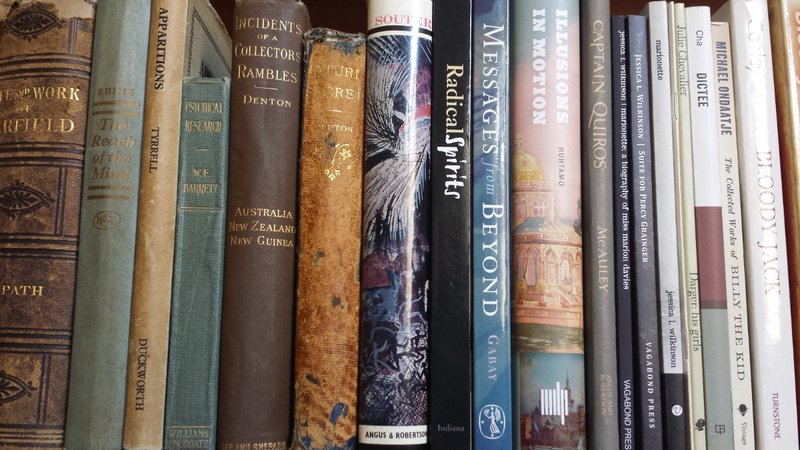Why Denton?

- Benjamin Laird
At my mid-candidature review, where I presented on my PhD progress, I was asked why I had chosen William Denton as the subject of my biographical poetry.
A decade ago, when I was collecting books on early parapsychology and psychical research (a hobby of mine at the time), I found William and Elizabeth Denton’s Nature’s Secrets. This is a UK version of the first volume of The Soul of Things, Denton's three-volume work on psychometry, though this version is special as it was “Edited with an introduction by a clergyman of the Church of England”.
Psychometry is the ability of a person to obtain visions or feelings when exposed to an object or place. William carried out a range of psychometrical experiments with his wife Elizabeth, sister Annie Denton Cridge and his son Sherman. The psychometer (the psychometrically capable person) would see the histories of objects (often concealed inside an envelope or hidden from view) and William would transcribe these visions.
According to a bright yellow sticker on the inside front cover of my copy of Nature’s Secrets, my book was once part of a Psychical Research Club Library and various pencil annotations remain—traces of the previous readers and owners. Sections have been carefully underlined or cross-referenced, too: the title page has a handwritten note “Psychometry—The word p. 80 invented by Dr Buchanan”.
I skim read Nature’s Secrets after I bought it and then placed it with the few other books I had collected. Having been published in 1863, it was at least 48 years older than my oldest book on parapsychology/psychical research: the aptly named Psychical Research by WF Barrett, a professor of experimental physics and founder of the Society of Psychical Research.
What stood out for me in Nature’s Secrets was a series of quotes at the end of the introduction. Among them is one, by William Wordsworth, from which The Soul of Things derives its title: “Enter into the soul of things”. Though I cannot seem to trace this particular quote, I have found one similar: “Thus deeply drinking-in the Soul of Things”. Further down the page, there is a quote by Charles Babbage from the Ninth Bridgewater Treatise:
The air itself is one vast library, on whose pages are for ever written all that man has ever said, or woman whispered.
For me, the quote captures the essence of Denton’s ideas of psychometry. Coming from a computer science and engineering background, I recognised Babbage’s name from his inventions, the Difference Engine and the Analytical Engine. So this statement, that appears as a description of the Internet or the coming Internet, was exciting. Here was the oldest book (physical artefact) in my collection with an analogy of a great networked database (digital artefact) of culture.
It was not, of course, what Babbage meant, but it does suggest how Babbage conceived the construction of the world—for Babbage, the world is a divine machine.
Denton was a Spiritualist and an internationalist—he believed in a greater world for humanity and psychometry was a science for that hopeful world. While it was originally the Babbage quote that drove me to use Denton as the material for poetry in networked and programmable media, the idea of psychometry as a metaphor for a democratic and progressive digital system has since become salient.
In a chapter on the utility of psychometry, Denton writes of its use to historians:
Who can estimate the value of psychometry to the historian? “History,” said Voltaire, “is a grand lie;” it will be the work of the psychometer to make it a grand truth. The biography of all nations is faithfully recorded somewhere, and all that is needed, I doubt not, can be obtained. What the soul asks for, Nature, in her superabundant fulness, is able and willing to grant.
This is Nature that wants to offer us what we need and it is a Nature that gives us “[t]he history of the people, so sadly neglected by historians, shall be sought for and found; for the life of the meanest plebeian is detailed as accurately as the deeds of the proud patrician”.
As I researched Denton further, I came across a range of other factors that drew me to him. Some merely coincidental—I had a copy of The Life and Work of James A. Garfield for no real reason other than it was published in 1882 and as it turned out Denton gets a mention in it. Others were local—Denton was in correspondence with future prime minister Alfred Deakin (buried near my house), and Denton died while in New Guinea on an expedition with Melbourne newspaper The Argus.
Ultimately, though, when it comes to the representation of historical figures, the material and formal presentation matters. Denton was an autodidact, a political radical, an abolitionist, a women’s rights campaigner, a temperance advocate, a poet, a publisher, a Spiritualist and a scientific lecturer. This diversity of qualities, as well as Denton’s own theoretical writings, make him someone that is best represented in poetry across media—print and programmable—rather than relying only on a traditional narrative form or database.